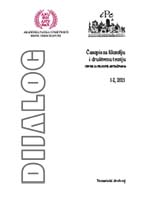Hegel i “lukavstvo uma”. Geneza i implikacije za suvremeni politički diskurs
Hegel and “the cunning of reason”. The genesis and implications for contemporary political discourse
Author(s): Pavle MijovićSubject(s): Political Philosophy, Renaissance Philosophy, 19th Century Philosophy, German Idealism
Published by: Akademija Nauka i Umjetnosti Bosne i Hercegovine
Keywords: Hegel; cunning of reason; Machiavelli; political discourse; political subject;
Summary/Abstract: A work entitled Hegel and “the cunning of reason”. The genesis and implications for contemporary political discourse is divided into two parts. The first part aims to contextualize Hegel’s syntagm “the cunning of reason” in his Science of Logic, Philosophy of Law and Philosophy of History, as well as in the epistolary corpus of the German philosopher. Our intention is to bring the genesis, context of the origin and use of this syntagm based on Hegel’s original works, first in works of a speculative character and then in those of a more practical orientation. In the context of a teleological discussion of the objective concept, Hegel introduces the syntagm “cunning of reason” which acquires much more plastic contours in his other works. It is related to world-historical individuals who actualize the “substantial act of the world spirit”. The second part of the paper aims to bring a contemporary reading of Hegel based on previous textual and content analysis. Hegel’s “cunning of reason” will be linked to Machiavelli’s ideas from the Prince, implicating deep separation between ethics and politics. The irrelevance of objective content in contemporary political discourse is a topic that synthesizes current political challenges.
Journal: Dijalog - Časopis za filozofiju i društvenu teoriju
- Issue Year: 2021
- Issue No: 01+02
- Page Range: 90-104
- Page Count: 15
- Language: Croatian

